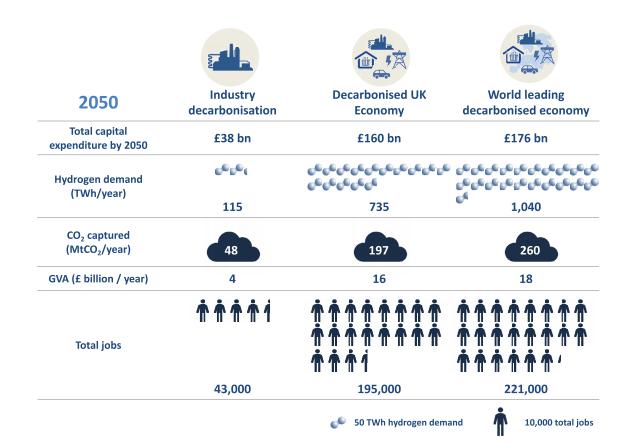
Following on from Tim Donaghy’s recent post on the skills gap within the renewable energy sector, I want to add some specifics on the hydrogen energy market. As a member organisation of the European Hydrogen Alliance, we are focusing our efforts on supporting other businesses within the renewables industry to achieve their organisational goals.
The UK, alongside several other countries, have all committed to “Net Zero” by 2050, something I am sure we have all heard by now. What you might not be aware of is the important role hydrogen will play in getting us there and reaching a hydrogen economy. It is by no means the answer, but it will play a pivotal role in the energy transition. For example, the Committee on Climate Change recommended prioritising investments into two complementary technologies to assist in the decarbonisation of the UK, hydrogen and carbon capture and storage.
How is decarbonisation benefitting the hydrogen sector?
Between now and 2050, it is estimated that the required capital to achieve decarbonisation for just the UK is in excess of £40 billion. The investment above will potentially generate more than 70,000 jobs across infrastructure development, operation, and indirect opportunities throughout the supply chain. This also includes jobs that will be created within the production of fuel cells and required components.

Source: Element Energy
As the UK leads the way with investment into the sector, recently awarding £28 million to five hydrogen production schemes, there is an obvious need to not only recruit now but also begin considering the market’s future needs.
According to a leading industry group the hydrogen market could be worth US$2.5 trillion by 2050. In order to meet its target to deliver net zero emissions by 2050, the UK will need to recruit hundreds of thousands of people into its energy sector, a figure recently published in a report by the National Grid. In order to recruit that workforce the industry needs to work with the education system now to ensure that the right skills and talents come through at all levels over the coming years – from schools and apprenticeships to higher education and professional development for those interested in transitioning into the industry.
What progress is the hydrogen sector making?
This week alone has seen a hydrogen plane take flight, a hydrogen train take its maiden voyage and hydrogen powered buses and bikes are not far around the corner. Whilst this is all very exciting, how will the leading organisations within the hydrogen space and those looking to enter recruit, at all levels, not just the Executive Board.
It is important that we avoid cannibalising the sector. By simply moving the same market experts around from business-to-business; without introducing new talent into the equation will not stimulate the required growth. According to IRENA, there were eleven million people employed within the renewable energy sector globally in 2019, the majority of those are within Solar, Hydro and Wind. When these markets were at a similar point in their trajectory, they were able to attract people out of related industries such as power, energy, and engineering and into the renewables space. It will require a similar approach now with the hydrogen economy.
The UK’s mix of high renewable energy capacity and strong climate change policies means that renewable hydrogen is likely to become cost competitive in the UK faster than in other parts of the world. With significant activity already taking shape across the UK, the skills gap will become apparent unless we tackle it now.
How will enabling a hydrogen economy be helped by recruiters?
It should be noted that the renewables sector is the biggest source of talent competition across the energy industry. Companies should be aware of this and ensure they are offering the best possible progression opportunities, not just to retain their current workforce, but to attract new talent from other sectors.
With any rapidly expanding market comes the obvious growing pains and associated challenges. For the interest of this post, we are specifically talking about the potential skills gap and how to approach it. There is obviously a need to ensure the right talent is coming through at all levels, which includes an inclusive and diverse mix of individuals.
At the executive level I advise organisations consider attracting candidates from alternative markets. This is what my team and I at Gibson Watts Executive Search are supporting current clients with. Providing a research driven and exhaustive process that offers clients access to individuals and talent from alternative industries that will bring the necessary skills, experiences, and subjective qualities to help achieve organisational goals.
Written by Josh Smith, Head of Executive Search at Gibson Watts

